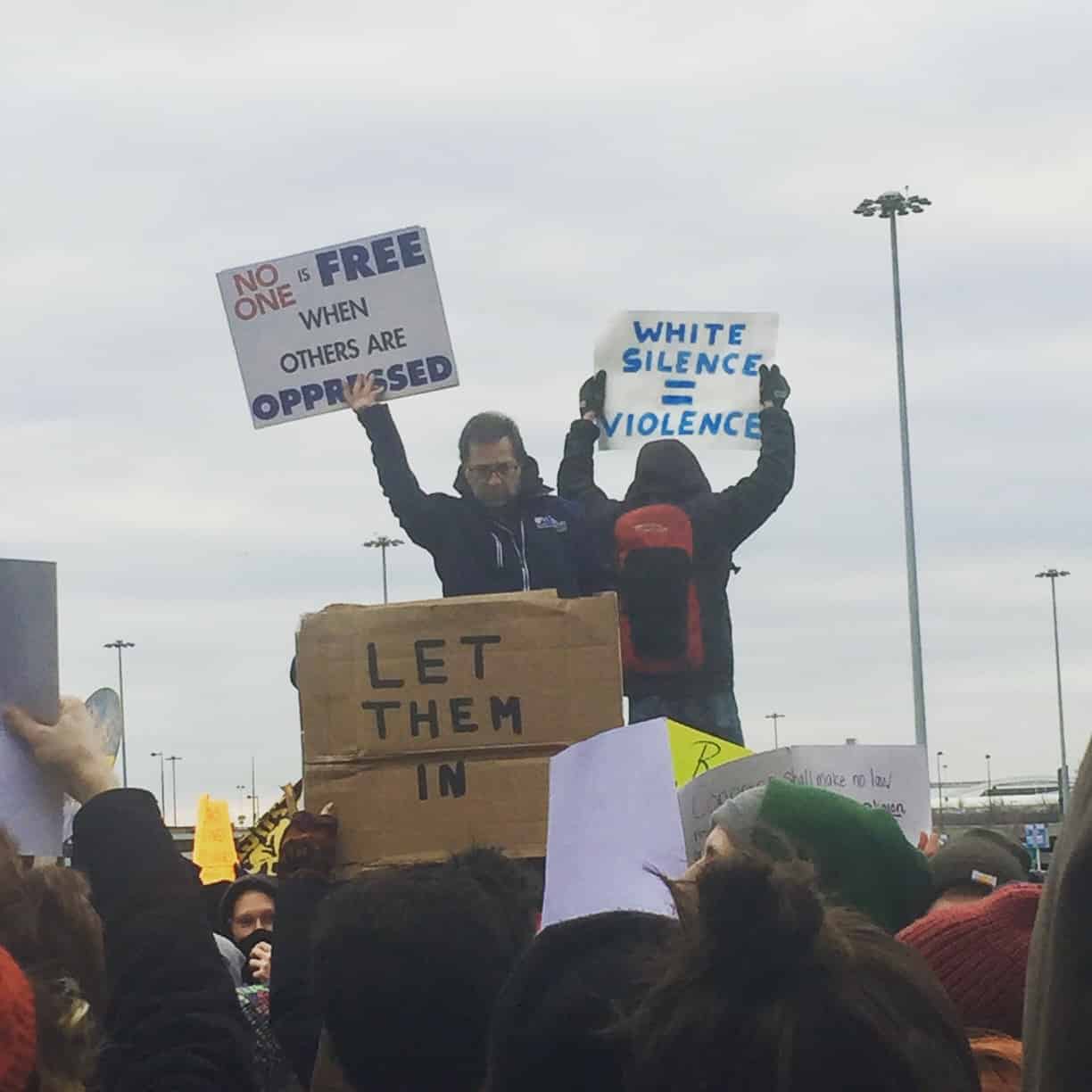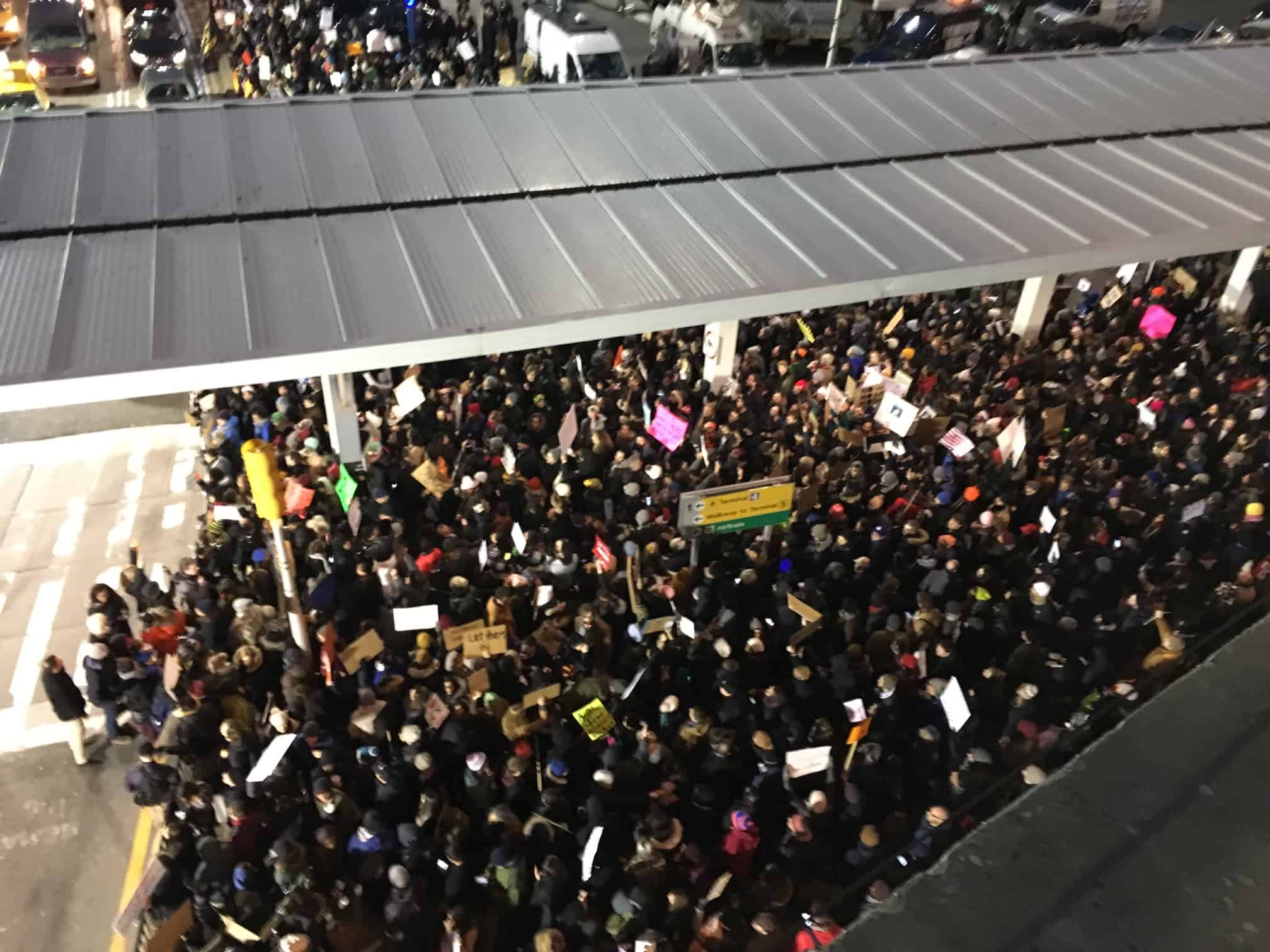Asylum-seekers and ordinary travelers from around the world — including dual citizens and U.S. green card holders — faced detention and were denied entry to the United States on Saturday, as security officials began to implement President Trump’s executive order temporarily barring all refugees and immigration from seven Muslim-majority countries.In response, protests broke out at airports in several U.S. cities, continuing days of pro-immigrant and pro-refugee actions under the banner #nobannowall, and the ACLU sued the government in an effort to block the order. At J.F.K. airport in New York City, a crowd of protesters continued to grow and reached more than a thousand people by the early evening. Security corralled the group outside Terminal 4 and locked down the building. Protesters chanted messages of welcome to refugees as taxi drivers honked in support. In a gesture of solidarity, the New York Taxi Workers Alliance called for an hour-long work stoppage of cabs headed to the airport.Actions were also scheduled for the S.F.O. airport in San Francisco, O’Hare airport in Chicago, and Dulles airport outside Washington, D.C. Virginia Gov. Terry McAuliffe, a Democrat, appeared at Dulles to announce that the state’s attorney general was looking into ways to help the people detained there.“You board a plane to come to America, you have the right to come to this country, yet when you land you are detained,” McAuliffe said.The order, which Trump signed on Friday, suspends the U.S. refugee program for 120 days and bars entry even for visa-holders from Syria, Iran, Somalia, Yemen, Iraq, Sudan, and Libya, all Muslim-majority countries. But there was plenty of confusion about the details, as the Trump administration seemed to have failed to account for different types of citizenship and documentation.The Department of Homeland Security confirmed that legal permanent U.S. residents (or green card holders) from the seven banned countries were included under the order, but that they could return to the U.S. on a “case by case basis.” The State Department also said dual citizens of those countries, including those with U.S. passports, were banned as well.News outlets reported the stories of refugees who had been on the verge of finding asylum in the U.S. only to be turned back this week after the years-long exhaustive vetting process, one Trump says needs to be made more extreme. Reports are also pouring in of students and workers who now find themselves in limbo abroad because of their suspended visas. Here are just a few of the stories of people and families affected by the order: The ACLU’s lawsuit named as plaintiffs two Iraqi men who were detained at the airport in New York on Friday and demanded their release. Both men had worked with the U.S. military in Iraq. One of the men, Hameed Khalid Darweesh, was released Saturday after 19 hours in custody. The other, Haider Sameer Abdulkhaleq Alshawi, remained detained. Darweesh spoke to supporters and the media outside the airport upon his release:
The ACLU’s lawsuit named as plaintiffs two Iraqi men who were detained at the airport in New York on Friday and demanded their release. Both men had worked with the U.S. military in Iraq. One of the men, Hameed Khalid Darweesh, was released Saturday after 19 hours in custody. The other, Haider Sameer Abdulkhaleq Alshawi, remained detained. Darweesh spoke to supporters and the media outside the airport upon his release: Charlie Travis, Olivia Becker, Rex Santus, and Jay Caspian Kang contributed reporting.
Charlie Travis, Olivia Becker, Rex Santus, and Jay Caspian Kang contributed reporting.
Advertisement
Advertisement
- A Yazidi couple, members of the religious minority in Iraq. The husband is a former interpreter for the U.S. Army in Iraq is in D.C., and had been expecting to reunite with his wife, who received her passport on Thursday, the day before Trump signed the order.
- A refugee family of eight from Darfur living in Jordan. They had been approved for asylum in the U.S.
- A Syrian family of two parents and four children, all under 16. Resettlement workers had prepared an apartment in Cleveland for the family, who were set to arrive from Turkey on Tuesday, but had to tell them the plans were off.
- An Iranian woman and her 11-month-old child. The child is a U.S. citizen and the woman was set to become one in two weeks.
- Five Iraqis and one person from Yemen stuck in Cairo. Reuters reported the travelers couldn’t board an EgyptAir flight bound for New York, but could not confirm whether they were refugees.

Advertisement
Trump says the ban is in the interest of national security and has denied criticism that it amounts to an unconstitutional targeting of Muslims. But the order instructs the U.S. refugee program to “prioritize refugee claims made by individuals on the basis of religious-based persecution, provided that the religion of the individual is a minority religion in the individual’s country of nationality” — in other words, Christians in these majority-Muslim countries. In an interview with Christian Broadcast Network Friday, Trump confirmed that Christians will be given priority over other refugees. A spokeswoman for House Speaker Paul Ryan, who came out in support of the order on Friday, maintained the ban did not amount to a religious test.Public outcry over Trump’s move continued in the U.S. and around the world on Saturday. Iran announced it would in turn ban U.S. citizens from crossing its borders. Canadian Prime Minister Justin Trudeau tweeted a message of support to “those fleeing persecution, terror and war.”Trump was asked again on Saturday whether the order amounted to a Muslim ban. He denied it was and said the measure was “working out very nicely. You can see it at the airports.”
